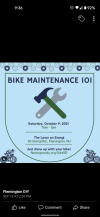Couple of years ago the local communities adult education setup had a class on how to maintain your bike, which was offered by one of the local shop. I would be up for a class like that which will allow me to do the minor stuff and take the bike to local shop for major stuff (anything around safety related - specifically brakes).
There is so much on YouTube now - someone should associate the best videos with each page of sheldonbrown.com!
Or at least collect the stuff into some logical progression. Or just google!
What you'll run into is not having the tools. Then finding a way to do it with what you have, and wondering why it doesn't quite work.
having some spare cables (if you do cables) and a cable cutter is a good start.
shock pump ! a must have for FS. a maybe for the hardtail.
decent allen keys, esp the kind with the ball end.
torx t handle
torque wrench in the bike range - they sell bike specific sets
chain whip
cassette removal tool
Chain break
Tire irons (or whatever they are called now)
then the standard toolbox with wrenches, sockets, screwdrivers, etc
small compressor helps
Oh, lots of different size brushes for cleaning - stuff gets gummed up
Then the correct lube for the part
What i miss?
Then have at it. You can always do like i do and bring it to the shop after it doesn't work quite right.
You'll be able to change brake pads, and reset the calipers with the right tools and a little practice.
My gut says @Karate Monkey would give great advice on how/what to get started and how to progress.
if he hasn't already written it up on here somewhere.
Plenty of the "shop" people will give an honest opinion if stymied. (hint: ask good questions after researching)








